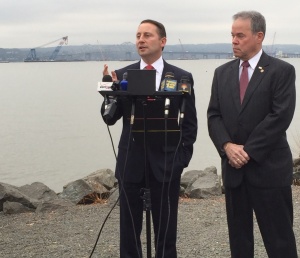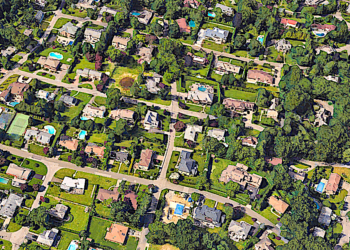The elected leaders of Rockland and Westchester counties say they have the answer to the multibillion-dollar question of how to pay for the in-construction Tappan Zee Bridge replacement: Use half of the $5 billion the state nabbed in a settlement with two international investment banks.
Rockland County Executive Ed Day and Westchester County Executive Rob Astorino, both Republicans, held a press conference Monday on the banks of the Hudson River near the bridge, calling on the state to use $1.95 billion it received in a settlement with BNP Paribas SA and Credit Suisse Group over breaking local and federal tax and investment laws.
Astorino said the revenue from the settlement should be used to pay for infrastructure projects in the state. “The money is right there,” he said. “We just need the governor to resist the temptation to spread the wealth to special interests and recurring expenses. With infrastructure investments everyone benefits.”

- Westchester County Executive Rob Astorino, left, and Rockland County Executive Ed Day call on the state to use $1.95 billion it received in a bank settlement to fund the Tappan Zee Bridge replacement.
The $3.9 billion twin-span replacement bridge lacks a definitive funding plan outside of a $1.6 billion loan from the U.S. Department of Transportation. With questions over where the majority of funding will come from, many have concluded that the toll on the current and future bridge will have to double or triple to pay for the construction costs and interest.
Day has said a large toll hike would discourage shoppers from crossing from the Westchester side of the bridge into Rockland for destinations like the Palisades Mall. The current cash toll is $5.
“Our commuters and businesses simply cannot afford the burden of even-higher tolls,” Day said. “Our idea to use a portion of the state”™s bank settlement money to fund bridge construction will keep the economic wheels moving in both Rockland and Westchester counties.”
The New York State Thruway Authority, which owns and will operate the new Tappan Zee, tagged $1 million in its $2 billion budget for 2015 to continue to pay for the construction. The decision of whether toll hikes will be needed next year was deferred last Friday into the new year, but the conservative group the Empire Center said the budget as it stands would necessitate roughly 4 percent systemwide toll increases. Gov. Andrew Cuomo, a Democrat, and authority leadership have pledged there would not be systemwide increases to fund the new Tappan Zee.
The question of how the $5 billion windfall will be used by the New York government has been a debate point between lawmakers. It”™s anticipated the money will be used to pay for state educational programs and potentially create an upstate opportunity fund for revitalization projects in some economically distressed regions. Other suggestions have included investment in the Metropolitan Transportation Authority, which some suburban and rural legislators have said would favor New York City projects and the city subway system.
New York recently lost out on the majority of $511 million in federal loans for the new bridge construction out of a clean water fund. The U.S. Environmental Protection Agency initially expressed reservations about the project”™s eligibility for funding through the program, ultimately rejecting $482 million in loans.
The state Authorities Budget Office, a state watchdog agency, later criticized the state”™s own approval of the loans in a Nov. 20 report that said New York”™s internal process lacked public engagement and had only “limited discussion.”
Some Westchester County business advocates praised the clean water funding because it would help keep the toll on the new bridge down. “Let”™s do the math,” said Ross J. Pepe, president of two building industry groups that represent 600 firms combined, after the announcement of the loans. “Higher environmental protection costs means higher tolls on the bridge. Lower loan financing costs means lower tolls on the bridge.”
Pepe is president of the Construction Industry Council of Westchester and Hudson Valley Inc. and the Building Contractors Association of Westchester and Mid-Hudson Inc.
Construction of the replacement bridge, which has yet to be officially named, began in October 2013 alongside the existing 60-year-old Tappan Zee. The new bridge is expected to be open to traffic in 2016.
















